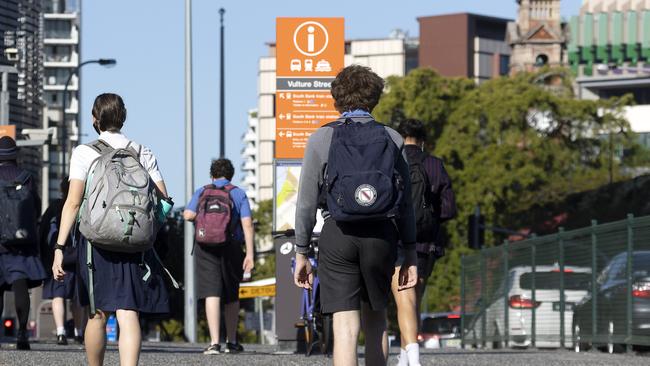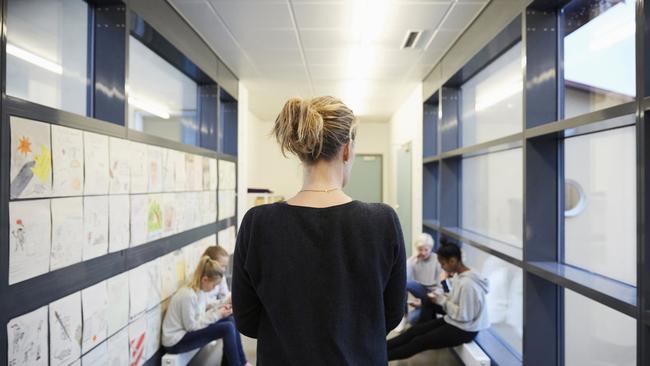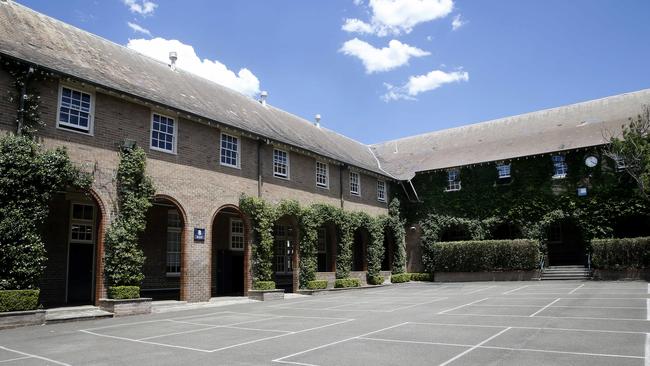Noel Pearson: Australia’s education system is critical to fixing its productivity problem
Australia’s education system is critical to fixing its productivity problem - so why don’t we know how to talk about it?

The role of school education in Australia’s productivity challenge is obvious. However, the Productivity Commission’s identification of the importance of lifting the education of our children is poorly articulated.
Australia needs to lift our schools one performance stage: from the good system that it is, to great. This can be done within six years: the time it takes to effect school system improvement, identified by McKinsey & Company in its landmark, and still powerful, report of 2010. If it’s serious about productivity the Albanese government needs to adopt this policy: shift Australian school systems’ performance from good to great by 2032.
This will mean four things. First, because there is no single system but a federation of systems and subsystems, the federal government must have a real plan to effect an Australia-wide school performance shift that does not allow any state and territory system and subsystem to drag its feet and resist the reforms required.
Second, there are anywhere between 250 and 500 schools (out of a total 10,000) that are poor. These are schools where it is of no value for students to turn up because they don’t receive the teaching that honours their attendance and results in them learning. These schools must be transformed, and this can be done promptly if you know what must be done.
Third, the vast number of Australian schools are fair and good. Many thousands of them. The majority are “coasting”. They could be much better. Underachievement is the problem with this large middle. The fair schools must move to good and the good schools must move to great.
Fourth, there are a couple thousand great schools. We need them to become excellent. For the past quarter-century Australia has had policy-illiterate ministers for education – Amanda Vanstone, Peter Garrett and Simon Birmingham come to mind – and the country made no progress with school education under Liberal-National and Labor governments from John Howard’s prime ministership to Scott Morrison’s. A succession of ministers from Brendan Nelson to Dan Tehan – including Julia Gillard – failed to turn around the decline in school performance compared with systems around the world. Even the most literate ministers, Christopher Pyne and Alan Tudge, failed.
Resourcing of public schools is shameful compared with private schools and needed to be remedied, but money alone will not turn Australian schools around. It is how money is used that will be determinative. The Gonski review of a decade ago focused on resourcing but failed to develop a national approach to turn around declining school performance. Its second iteration added nothing to the first. Enough time has passed for all to see Gonski was a waste of time. David Gonski failed because his review was determined to be agnostic about pedagogy: teaching. He did not want to arouse an ideological confrontation on the most important reform missing from the debate: the necessity for teachers to teach first.
My friend and education policy wonk, Ben Jensen, called his schools organisation Learning First. I say to him: Ben, it should be Teaching First because learning follows teaching. As the founder of Direct Instruction, Siegfried Engelmann, always said: if the student has not learned, the teacher has not taught. This aphorism is at the heart of the ideological impasse on pedagogy. Can you believe we still don’t agree whether the knowledgeable teacher should first teach the as-yet not knowledgeable learner?

Yes, there is now greater adoption of direct and explicit teaching in Australian schools, and news stories abound about the transformation taking place in classrooms across the country. There is now talk of a science of learning and the science of reading. Every galah in every pet shop is spruiking evidence-based teaching and learning, a far cry from the situation a decade ago.
I am not elated, however. In the new enthusiasm for “phonics” in the teaching of reading, there is a simplistic inclusion of one or two elements of effective initial reading instruction without comprehending the power of the whole, and how decisive the details are. Not all spotted dogs are dalmatians, my mentor, Engelmann, was wont to say. Year Three phonics and math checks won’t effect the instructional shifts that are needed. Bureaucrats and ministers don’t understand this.
The second reason for my despondency is that the take-up of effective teaching methods is taking place largely in schools in the middle. The schools that most desperately need effective teaching – not the least, schools serving Aboriginal and Torres Strait Islander children – are still trapped in the dominant paradigm that has been failing for decades.
They say teachers and school leaders need to be provided with the evidence of effective teaching practices. Social Ventures Australia established Evidence for Learning, modelled on the work of the Education Endowment Fund in Britain – and over 10 years never once recommended direct or explicit instruction.
Anyone with a passing knowledge of the state of evidence would be puzzled as to how an organisation dedicated to compiling and disseminating evidence could not bring itself to say the words “direct instruction”. Let’s sound it out: di-rec-t. Say it fast: direct! Sound it out: in-struc-tion. Say it fast: instruction! Say the whole thing: direct instruction!
The second round of Gonski recommended funding to further this dubious advocacy of evidence, which ended up in the Australian Education Research Organisation, headed by Jenny Donovan. AERO is better than its ideologically constrained predecessor, but unlike the naive Productivity Commission I wouldn’t be hanging my hat on AERO driving the teaching change that’s needed.
The problem is not the availability of evidence, it’s the adoption. The evidence about effective teaching of reading in our country is 20 years old. What needed to happen in Australian schools was made completely clear by the National Inquiry into the Teaching of Literacy led by Ken Rowe. Rowe was a tragic victim of the 2009 Black Saturday bushfire in Marysville, Victoria. His report was his gift to his country, which we squandered.
Nelson was the minister who tabled the Rowe report, and he never understood its importance and did nothing to turn the evidence into adoption in Australian schools. This was because he and prime minister Howard were able to mandate the construction of flagpoles in every school in the country but they couldn’t do the same with the adoption of effective reading within these same schools.
Nelson was a failure as education minister and he was followed by a succession of them. None of them could solve the problem of a federation of school systems and subsystems. Putting conditions in funding agreements? Too weak. No system changed because of funding conditions. Get all jurisdictions on to the same page on policies? Only if you water down the policies to their lowest denominator.

Had we started adopting Rowe 20 years ago, Australia would be leading our international peers instead of badly trailing them as we are. Generations of children whose lives have been blighted by illiteracy – who turn up in youth justice and adult incarceration systems – could have had better lives through the transformational power of literacy. Generations of young Australians who underachieved in their schooling could have done better, got into better jobs and careers, taken advantage of more opportunities – we would have more home-grown skilled workers without heavy reliance on skilled migration. Our productivity and prosperity as a country would be two decades advanced had we implemented Rowe. Are we going to deny the role of school education failure in our stagnant productivity?
So what to make of the agreements struck by the Albanese government with all states and territories from 2025 to 2034, with the final deal with Queensland concluded on the eve of the election campaign? Education Minister Jason Clare is as literate in schools policy as Tudge and Pyne, possibly more so. He has succeeded in locking all of Australia’s schools systems into an agreement that will run for the next decade. But what do these agreements entail and what will it mean for school performance over the next 10 years? The public doesn’t know what is in these agreements. This is unbelievable.
We went through a five-week election campaign and no one interrogated the details of the huge funding deals on schools. No one was interested in asking: What’s going to make it different this time? How can we be assured this money is going to produce the step change in school performance that we want and need?Not a word.
The education policy debate is susceptible to diversions. Remember the long obsession with improving teacher quality? The Abbott government undertook an inquiry into initial teacher education under Pyne. A second one was undertaken under Tudge. As obvious as teacher quality is to student outcomes, my view was and still is that we can’t and do not need to wait for the perfect teacher.
The initiatives coming out of these useless inquiries were never going to result in any changes in the near term. We have the teachers who can produce the changes. We must instead focus on the verb, teaching, and not the noun, teachers. We can’t change the quality of the noun but we can change the quality of the verb. And when the quality of the verb changes, the quality of the noun does too. Instead Tudge and Pyne diverted to something that won’t produce results for decades, if at all.
Remember the enthusiasm for “feedback” that the Grattan Institute banged the drum on? And “targeted teaching”?
These are not bad in themselves but they are diversions from what must be the real focus: effective teaching. Grattan came late to explicit instruction and still has no idea about Direct Instruction.
Mona Mourshed was the genius behind McKinsey’s 2010 playbook for school system improvement. Clare should bring the brain of this Egyptian-American based in Washington to bear on the most difficult aspect of the Australian context: the ragtag collection of systems and subsystems that make up Australian schools.
No one knows more about how the international evidence on school systems improvement interplays with context. Her lackeys at McKinsey should provide pro bono support, because she makes them shine.
My dream team would be Mourshed and the former chief executive of schools in the Canberra-Goulburn Catholic Diocese, the engineer turned school reform champion, Ross Fox. Fox led a revolution in this subsystem of 58 Catholic schools, centred on effective teaching. He achieved a step change in subsystem performance within the time-frame evidenced by Mourshed: five years.
It was Mourshed who first made clear in a 2007 McKinsey report that there was only one lever for school and system improvement: effective instruction. This is what lifts schools. Every thing we do must support the goal of improving instruction.
Fox has left Canberra-Goulburn. I fear for the progress they made. I know how easily ignorance or malignity can unravel progress. But it means he’s available if you want someone to drive a playbook, Minister Clare. Mourshed is the brains though, she wrote the playbook.
Which brings me to a last diversion. Janet Albrechtsen is right to focus on the role of curriculum but her focus is off. Her obsession with culture wars means she attributes too much to the “cross-curriculum priorities” mandated by the Australian Curriculum. In the scheme of things that are problems with the national curriculum, this is trivial.
Tudge was similarly diverted by cultural issues. In fact Liberal governments had 10 years to fix whatever problems they say they have with the curriculum. Didn’t Kevin Donnelly and others undertake reviews on their behalf at verious times?
Of more substantial concern is the parlous comparison between the standards mandated by the Australian Curriculum and curriculums in other countries. Jensen’s 2023 benchmarking report sets out a terrible comparison of Australia’s expectations of science learning against other countries. Australia has the lowest expectations, far below the US, Singapore and Britain. If the same applied to other subjects then this is a major problem for Australia.
What you teach is intimately linked to how you teach. We have to fix the how of pedagogy and the what of curriculum in order to improve instruction. Let’s see, we wasted the first 20 years. I’m sure we can waste another two decades doing the same thing. We should expect the same results.
Noel Pearson is founder of the Cape York Partnership, director of Good to Great Schools Australia and a director of Fortescue.


